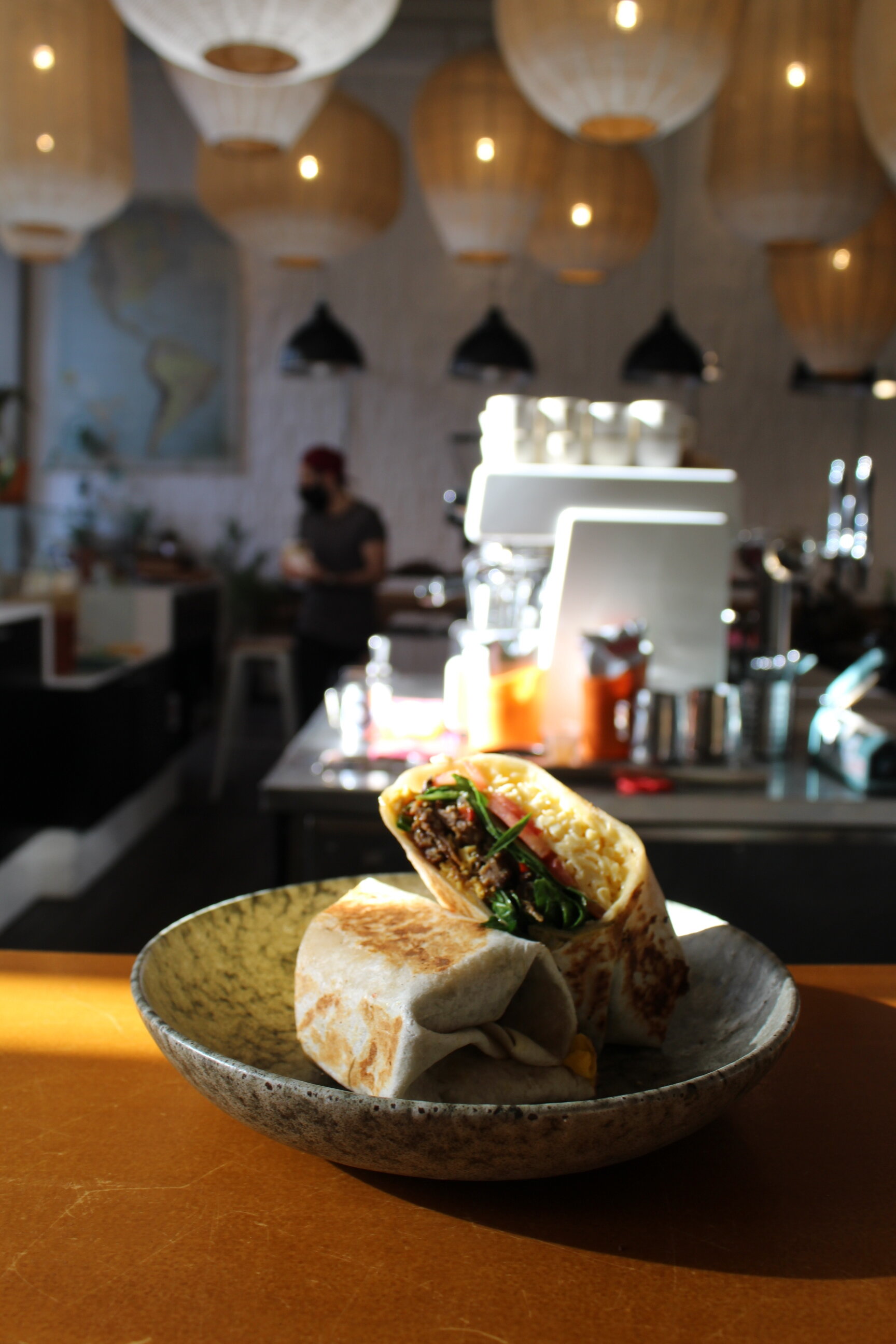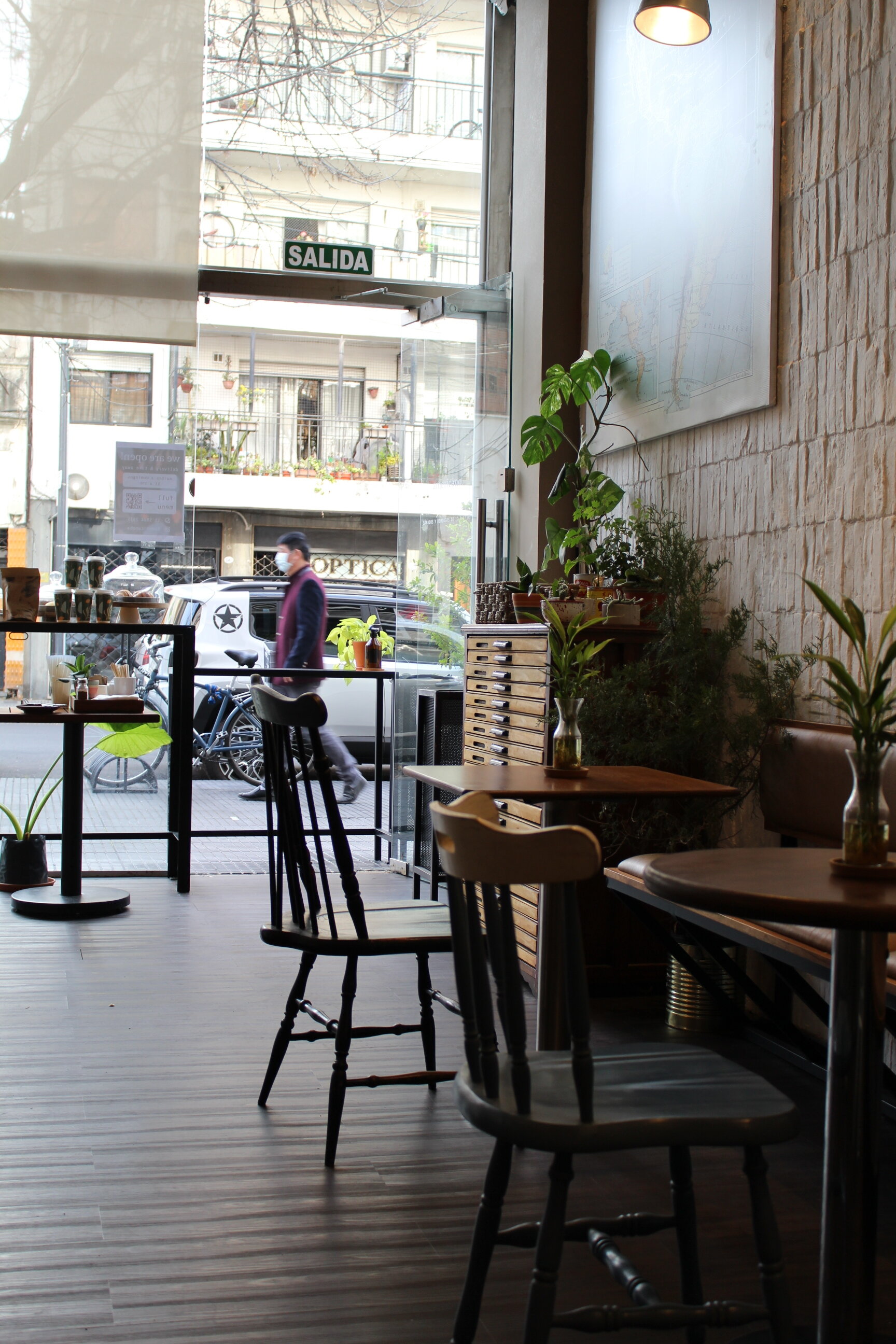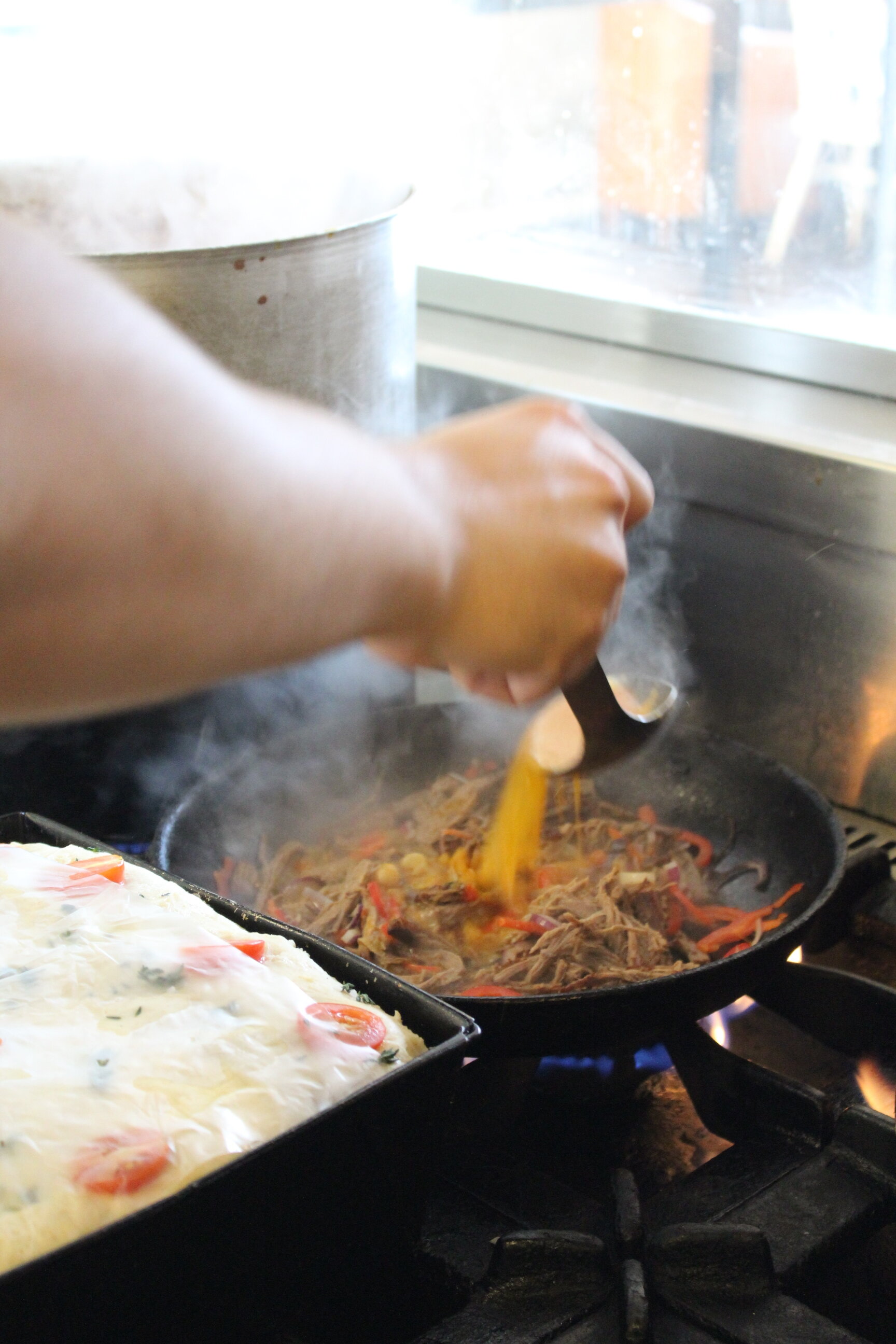
A WORKPLACE REVOLUTION: UNLEARNING THE RESTAURANT WORLD’S BAD HABITS
July 16, 2020
Peter Drinan squirts alcohol onto the soles of my shoes and clinks his elbow against mine before asking me to head to the restroom to properly scrub my hands. The lack of people inside Americano is a bizarre sight. The all-day diner-style eatery, which specializes in teasing out the commonalities and celebrating the differences of food from the Americas, rarely had an empty seat. It always seemed to me, nothing short of magic, that a single bar stool would vacate at exactly the moment I arrived.
Despite the absence of patrons, the energy still fills the space tightly. Wu-tang Clan plays loudly over the speaker and a brand new basketball stand sits precariously in the corner. As I round the U-shaped bar, barista Andres Sabogal enters full zen mode studying the smell of freshly ground coffee while chef Andrea Sivira carefully crisscrosses oyster mushrooms with charred brussel sprouts over quinoa risotto. I climb over boxes of bananas and long strands of garlic, a jerried neighborhood vegetable stand, as bartender turned baker Francisco Bongiovanni emerges from the corner of the room with a steaming pan of persimmon cookies that pulls the rest of the team out of the kitchen. Peter introduces me and I am received with a waterfall of holas from every side of the room.
Tali Bek Marelli raises her head from her computer at a makeshift office space. She is the brains behind the restaurant's communication and team development. The pair, who married last year and took over the space just two months before the country was paralyzed with a national lockdown, are restaurant and bar veterans. Drinan worked and traveled in Colombia and Mexico before working in high end restaurants in Buenos Aires. Buenos Aires born Marelli moved from the corporate world to managing a group of 4 bars and restaurants. Together they opened a restaurant with the intention of letting sustainable practices seep into everything that they do.
We sat down to talk about unlearning the bad habits of the restaurant world, the importance of solidarity and constructing equitable work communities within an industry that runs from changes to the status quo.
Americano is a unique restaurant in Buenos Aires in terms of really embracing a holistic approach to sustainability. A lot of people confuse that term with something that is strictly environmental when it’s really about fostering positive impact in all of our surroundings. Can you tell us about where this broad understanding of sustainability we see here comes from?
Peter: My mom was the sanitation commissioner in New York City. She has been a fanatic for recycling and handling garbage and sustainability processes and that definitely is where my [environmental] interest in this was borne out. Having a really soft impact on our environment and immediate surroundings and having a really strong impact on the people that we work with is where our interests come from. We want to be sustainable and we want it to be a guiding principle rather than doing the bare minimum to be able to say, ‘hey look at this’. We really wanted it to infiltrate everything that we do.
I’m really interested in the human aspect of sustainability here but can you talk to me a little about the environmental side and the challenges of running a restaurant with that philosophy in mind?
P: Maybe about two weeks before this all started we were really beginning to hit our stride. And the biggest thing is that it takes a lot of retraining of ourselves against bad habits that have become instinctual. Composting, for example, most kitchens in BA have one garbage can and everything goes in. We have started working with a compost garden to separate and sort all of our organic matter. With our ingredients, it has a lot to do with the producers. The first thing we analyzed in terms of our purchases was we aren’t going to buy anything that comes in a bunch of little packages and we try to really seek out reusable packaging. That immediately limits the number of purveyors that you can buy from. We buy a couple things from vendors but it’s mostly direct contact and right now we are somewhere between 86 and 89% organic. We have in our mise-en-place about 180 items and I’d say that comes from about 90 different people that we purchase from. All this is very much an ongoing process.
What are those conversations like with producers when you sort of lay down the law with them and ask them to re-think, at least with you all, what they are doing?
P: There is a resistance to change. Just complete blind resistance to change. This idea that reducing packaging and reducing the amount of things is going to be more difficult. And that’s usually just based on ignorance because it is actually easier, it’s cheaper and obviously just better. So the conversation is always, ‘either we’re going to do this or we’re not going to work together’, and usually what happens is they will try it once and once they see it can be successful there is this immediate openness.
Tali Bek Marelli & Peter Drinan
And besides the logistics, we are talking about a whole other set of costs too, which is a concern that I’ve also heard a lot of particularly for really small restaurants.
P: Sometimes people look at an extra costa and it can be a mental barrier, right? The compost garden in Coghlan costs us $8000 a month to maintain, but the more people that latch onto it, the cheaper it becomes for each participant. There are so many hidden costs in a project like this that you can’t simply break down into a spreadsheet. People are happier at work and they come here more motivated and they cook better because they are happy and they reduce waste because they become plugged in to your system. How do you measure that in terms of profit? I am 100% positive that all of the processes we have implemented add up to way more than those $8000 we spend to compost.
Yah, I think that mentality is particularly present here. Constantly thinking about the value of money and inflation is just a part of the national psyche.
Tali: Argentina has never had the opportunity to think long term. Everything changes every six years, every two years, every new presidential party that comes to power. Mortgages are completely inaccessible. Saving is impossible. We don’t have a lot of understanding of investing, anything like that that someone born in the United States or parts of Europe has integrated into their lives. That’s really unfortunate, as a people, to not have the opportunity to have foresight.
You can definitely feel the closeness of the team and that really has to do with the human connections you two have built here. Everyone here is formally employed which is pretty unusual in Buenos Aires. What have you two sought out to create in terms of a team?
T: I learned a lot of things [managing a bar group] that I didn’t want to bring with me, and were ultimately why I left. We are all raised to think a certain way and so when you are in the middle of it all, it’s not always easy to identify the pain points. That’s gradual. I was always the only woman in meetings amongst all male managers and owners. Sitting down at a meeting was so hard. I felt very lonely during those meetings. I also heard a lot of things that at the time, I just ignored, and I really regret it because I believe that I should’ve said something. And when I did start speaking up, it was apparent that I needed to leave. But that experience made me very self-aware. I think culturally, we have this idea as Argentines, that we are always the best. And so, who cares who is making the cocktails if it’s the best cocktail. And it matters a lot who that person is and how they feel.
This is definitely an industry that reinforces a lot of abuse and uneven power structures.
T: There are so many people that are like, ‘these people are lucky they get paid on time’ or ‘they should be happy they are working here’. That is basic. But there is this attitude where everything we do is so great, so amazing, we are so cool. We have this culture that celebrates these people that are so horrible to other people. No one talks about it. But that needs to change. I think that cooks are starting to care less about working with this name recognized chef and are caring more about the values of that chef regardless of who they are.
P: We in particular, we want to put non-white, non-heteronormative people in positions of power. I always want to have a woman in charge of the kitchen. With our team, we have really had to sit down and think about what we want to do, because without a plan change isn’t going to happen. Having a woman lead the kitchen was one of them.
Andrea Sivira, cook
Why is it important for a woman to lead the kitchen?
P: I have worked in a lot of kitchens run by men and one kitchen with a woman in a position of power, and that was by far my favorite kitchen. We want to get rid of all machismo in the kitchen and approach this more like a tech company. One of the major problems in gastronomy is that everyone in the kitchen is accounted for and if you have one person that can’t come to work that affects the entire team. We want to make it so that no one single body is necessary for the functioning of the restaurant. We want people to be able to take a sick day. If you want to take a mental health day, you can do that in good conscience. If you want a long weekend, and plan that responsibly, do that. There is no room to breathe in a traditional restaurant environment and for women and people of color and people that aren’t heteronormative, that space to breathe is even less.
T: One day, we read this article about David Chang and why he didn’t get involved in cases where his colleagues were abusing their power over their female employees. He said that he regretted it and didn’t know any better. When he was asked what he was doing to be more respectful of women and their work environment, he didn’t give anything concrete. We’re paying attention. We’re talking to people. And it’s like, ok, what do we actually do? What are the actions that we can bullet point that we are doing to facilitate a respectful work space? And I remember asking Pete, what if tomorrow our jefa left, and we have two people, a man and a woman going for the position and the man is better at that job. It’s going to be the woman. And it’s because, that man has a lot more places to work than she does, and giving her that opportunity and giving her that space, even if she leaves, she was given the opportunity to get to where the male chef was when he came in for the interview, and we want to be that place that gives her that opportunity to learn and show what she can do.
I’ve worked in a lot of kitchens with my pop-up over the last four years, maybe 80 and without a doubt the best kitchens to work in are led by women. The energy is different. Those kitchens always feel more like a community rather than a competition. I’ve walked into a lot of kitchens where the cook on his way out to let me take over kind of looks at me like, who the fuck is this dude in my kitchen.
P: Yeah, and competition can be healthy but it needs to be concentrated. Not who is the best at everything. Because everyone is the best at something. So, today we want to make the best mac n’ cheese, let's have a competition to see who makes it the best. Then let’s allow that person to teach the rest of us how that is done. And those are competitions that have a structure [sic] a beginning, a middle and an end rather than this competition that is omnipresent and in everything. The only way to not have that machismo is to not have men in power or really retrain a man against the rhythms of that machismo.
T: When we are hiring people, of course, we want to know that they are capable but not in a really strict way. We are really open to people learning here.
P: We actively field young people who don’t have experience in other kitchens because that allows us to start from the ground and build good habits from the beginning.
T: Fran, who used to work with me as a bartender, came to me and said he needed a change. He couldn’t deal with that work environment. So we brought him on. He is an amazing bartender but right now he has taken over the pastries. And we are supporting him and we all help him and we give him the room to experiment. But when we hire people, we are looking for that same openness.
P: Our long term goal, we don’t want to be unmovable. A really big issue in the industry is the lifecycle of a cook. Most only stay somewhere a year. And it makes sense. If your job doesn’t have very much content to it and doesn’t have room to grow, why would they stay? So we really want to tackle that problem. That doesn’t mean we want to hold on to people. But we want them to stay here for as long as it feels good for them and that this be a living thing that has a positive impact on our people.
I was in the kitchen with the guys, and they were talking about trabajo en negro and discussing the problem with using the word negro and how vocabulary reinforces power structures. [Editor’s note on terminology: trabajo en negro or ‘black work’ is work done under the table; trabajo en blanco or ‘white work’ is formal employment]
P: That’s awesome. We try every two weeks to have a group meeting and have those conversations and we actually did have a meeting about the use of terminology and how terminology can denigrate.
And hopefully that same influence extends beyond here.
T: A good way to effect change is to be open to other restaurants. You can see newer restaurants or restaurants run by younger people are a lot more open to sharing whether that is sharing your list of contacts or literally sitting down and working out ideas and sharing experience, that is really important, because we need to get rid of this idea that we are all against one another and we are all each other’s biggest competitors. We don’t live in an economy that allows us to be on our own. And much less now. No business can be run on its own. We all need each other. You quickly realize that effecting change isn’t this competition, it is very much community work.





